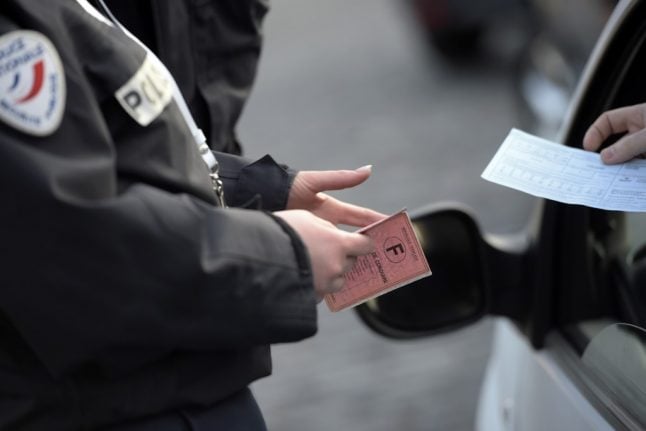The situation been a headache for not only British people, but also for the Centre d'Expertises et des Ressources des Titres – Echange des Permis Étrangers (CERT) which receives all the applications from the whole of France except Paris.
Their office in Nantes, northwest France, has therefore been overflowing with applications for months.
We asked Baptiste Mandard, Deputy General of CERT, for his advice to British residents in France. His answers relate only to people who are already resident in France by the end of the transition period (December 31st, 2020).
READ ALSO What are the rules for driving in France after Brexit?
The Local: Will British driving licences still be legal after Brexit on January 31st?
Baptiste Mandard: Yes. As long as the licence has not expired, there is no reason as to why you cannot drive on a British licence after January 31st.
TL: For how long?
BM: The transition period lasts until December 31st 2020 and there won’t be any changes to the rules until after that date.
However, if your driving licence has expired or been suspended due to an infraction, you must convert your British licence into a French licence so that the French government can withdraw the points necessary.
Anyone who loses one point or more on their driving licence will need to do that [previous advice had been that this was only necessary for offences that deducted three points or more].

It is not necessary for all British drivers to convert their licences to French ones, only in certain circumstances. Photo: AFP
TL: How many British driving licence exchange applications are currently waiting to be treated at the CERT office?
MB: Since we opened our service two and a half years ago we have received 22,000 applications from UK citizens who want to exchange their driving licences. We still have 5,000-6,000 applications left to deal with.
The rest of them we have already answered – whether we accepted the exchange or not, we have sent out our answer.
TL: How many of the applications are declined?
MB: A third of all the applications – not just the British ones – we receive at CERT are incomplete and thus declined.
TL: How long can people expect to wait for their application to be dealt with?
MB: New applicants will get an answer about 3 to 4 months after they sent in their application. Old applicants (ie those stuck in the backlog] can expect a delay of six months, starting now.
About 50 percent of all the applications we received here in Nantes were useless. The applicants asked for an exchange, but they didn’t need to. These applications are not prioritised. First we deal with the applications that we consider urgent.
TL: Which are the urgent cases?
MB: The urgent cases are the people that have had their license suspended, those whose licence have expired, or those who have added a qualification on their licence and need to update it – from car to truck, for example.
TL: Will the applications that aren’t considered urgent be declined?
We ask people to wait in line, they are not a priority. We also ask people to wait to apply until we have launched our online procedure.

TL: Is that part of a plan to reduce the waiting time?
MB: Yes, we are launching an online registration platform to simplify the application process. Today you have to send in your application via post, but soon, probably sometime in the coming six months, you will be able to register online.
One of the reasons as to why we are moving to an online platform is that many of the applicants have moved and don’t receive our letters. That's a difficulty for us.
We have also completely reorganised our service. We have recruited more people and simplified our processes.
TL: What should a person do if they have applied for a French licence but have not yet received it, but their British licence is on the verge of expiring?
MB: As long as the licence has not expired, the person can still legally drive in France. It is the expiration date that matters. After the expiration date the person cannot drive anymore.
We are doing our very best to reduce the delays. We have managed to get them down from six to about 3-4 months. However I advise people to apply for a driving licence exchange at least 6 months prior to the expiration date just to be sure that they get their new licence in time.
TL: Is it possible that some applications have been lost in the process?
MB: I can imagine why you ask due to the delays. But bear in mind that that we have received a lot of applications. Sometimes people write us to ask where their applications are, but – and I cannot stress this enough – we are dealing with it as quickly as we can.
TL: What is the best way for people to check on their application?
MB: If people have an urgent, specific request, we ask them to write us via email. There is a simple online procedure that they can use in the case of an urgent request (link here).
TL: Some of our readers have told us that French police officers have told them that their licence is no longer valid and that they had to convert it into a French one. Are there any documents online or similar that people could show the police if they find themselves in such a situation?
MB: This is new to me. As far as I know there is no need for any supplementary documentation on the side of the driving licence. The British driving licence itself is sufficient.
TL: Do you have any other advice to British people in France regarding their driving licence exchanges?
MB: Come to us either if you have lost points on your licence, if your licence is about to expire or if you have added a qualification on your licence. Otherwise you do not need a French driving licence. We have a full year to look at what happens after December 31st, so there is no need to apply for an exchange now. Wait for our online platform.
Right now we just really would like to reassure your readers: you can still use your British driving licence after January 31st.
Note – for British people who have already applied for a licence and are stuck in the backlog at CERT, some may find that their photocard licence expires while they are in the queue. For those people, there is no need to panic, they can apply to the DVLA back in the UK for a certificate of entitlement that will allow them to carry on driving. For full details click here or head to the Facebook group Applying for a French Driving Licence to find out more.



 Please whitelist us to continue reading.
Please whitelist us to continue reading.
Member comments